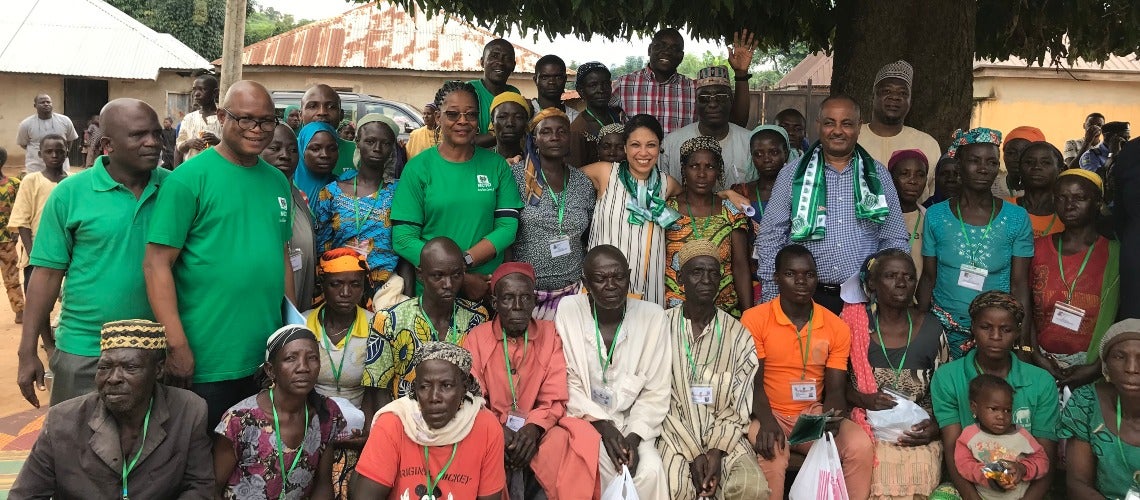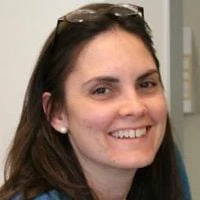 Iffath Sharif meeting with beneficiaries of the National Social Safety Net Operation in Nigeria. Copyright: World Bank
Iffath Sharif meeting with beneficiaries of the National Social Safety Net Operation in Nigeria. Copyright: World Bank
Iffath Sharif is the new global director for social protection and jobs at the World Bank. She leads the Bank’s work to develop social protection systems that help poor and vulnerable people cope with crises and shocks, as well as its efforts to promote good, inclusive jobs that provide a pathway out of poverty. In this interview, Iffath discusses how the Bank’s social protection and jobs work is making a difference.
- Why are social protection systems and helping people find job opportunities so important for ending poverty on a livable planet?
The Bank’s mission--ending poverty on a livable planet--means working towards decent lives for everyone. It’s helping to provide families with the means they need to provide nutritious meals, to send their children to school, to meet healthcare needs, to cope with any shocks, and to aspire to a better future.
The World Bank’s work on social protection and jobs is a pathway to providing vulnerable people the support they need to meet these necessities. People living in poverty are at a disadvantage. The obstacles are objectively tougher. Finding work opportunities or navigating the perils of a warming climate while bearing a disproportionate burden of the impacts of climate change is harder for people who are poor. We believe that social protection and jobs support that is targeted to poor and vulnerable people, tailored to meet their needs, and timed to cope with shocks can make a significant progress in achieving the Bank’s mission.
Our work on social protection and jobs is hardwired to reach the most vulnerable, and right now we have a footprint in 80 countries – providing the foundations to build on and do more.
- Can you give us a preview of what the Bank is working on in these areas?
We are living in unprecedented times. The Bank is on the forefront of the crises and challenges that are disproportionately impacting vulnerable people. Poverty, rising food insecurity, ageing populations, a worsening climate, rapidly changing technology. You name it.
What we do is help untangle these big challenges into avenues we can tackle in a practical and impactful way. And this comes with a vision for social universal social protection coverage to ensure poor and vulnerable people have the support needed when they need it.
In coming into this new role, I’m excited about three shifts in our operations. For instance, using established digital delivery systems (for identification, enrollment, payments, case management), the potential to scale and expand the mix of social protection and jobs interventions is high. We are adapting to country demands, often in vastly different contexts. For example, scaling to ongoing food and nutrition crises, addressing labor shortages through managed migration, or devising strategies for aging populations via better elderly care and old-age income security solution.
Jobs are key to fighting poverty so that’s a big chunk of our work. Informal, low productivity jobs are the norm for most low-income countries. In a changing world of work that affects all populations across income levels, integrated social protection and jobs interventions are especially critical for youth populations, empowering women and adolescent girls. Our recently published report, Working Without Borders: The Promise and Peril of Online Gig Work, looks at how this type of work offers new job opportunities and new forms of social protection solutions. Our forthcoming report on Jobs for Development will help countries define policy priorities to support jobs-rich economic growth around the dynamics of structural transformation.
There is increasing consensus on the need to link social protection, jobs and climate resilience. Our second State of Economic Inclusion will showcase how countries can use adaptive social protection programs coupled with economic inclusion programs to help poor people successfully tackle climate shocks while helping with the “green transition.”
- What’s new or different in the Bank’s approach to these areas?
We pursue a two-pronged approach: creating new knowledge and integrating that knowledge in countries with financing to effect change and impact. This entails a constant process of learning by doing. While this approach involves enormous effort by our teams to coordinate among researchers, policy makers and implementors, it can have transformative effects on national programs and policies.
The current World Bank portfolio in social protection and jobs stands at $26 billion. It reflects a blend of knowledge, technical assistance for innovation and experimentation, financing, and implementation support to partner countries. It benefits from the more than two decades of knowledge work that helped to build country systems from scratch, especially in sub-Saharan Africa. These tremendous efforts of past Bank colleagues are what allowed such an impressive Bank response during the pandemic, country after country.
The World Bank is committed to achieving universal social protection, the cornerstone of inclusive development. And we cannot do it alone, nor can our partners or clients. So finding ways to work coherently and smartly with partner organizations for common goals is especially important.
- What is the greatest influence in your work as a passionate development professional?
My journey as a development professional started in the villages of Bangladesh, working for a microfinance NGO in the late 90s. I saw firsthand how poor families can take charge of their lives with a little bit of support. I became a “development optimist” if you like and found my passion in social protection and jobs.
And the person who has had the greatest influence on me is Sir Fazle Hasan Abed, the founder of BRAC. Having had the opportunity to follow his work and listen to his journey and vision, I continue to believe that if we do it right, we can change the lives and livelihoods of the world’s neediest people, the most deprived.
- Where would we catch you on a typical weekend?
A long walk, followed by a gluttonous Bangladeshi meal at a “dawat” with family and friends.
To receive weekly articles, sign-up here


Join the Conversation